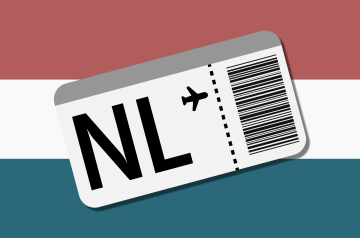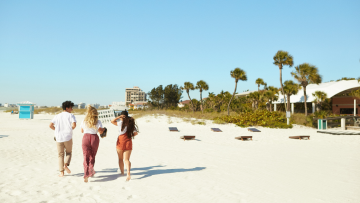
Oktoberfest 2023 – How much should you budget?
Millions travel to Munich each fall to visit this world-famous Bavarian festival. Read on to learn all about Oktoberfest, what it costs to attend, and more.
11 min read
Ahhh…Oktoberfest! Starting on September 16th, 2023, ‘tis the season for Bavarian delicacies, Wiesnbier, roller coasters, and plenty of reasons to say “O’zapft.” If you’re planning on traveling to Munich for this famous festival, read on! We’ve got you covered with history, facts, prices, and tips to make this Oktoberfest one you’ll never forget. While many Munich residents flee the city during Oktoberfest in search of calm mountain towns, millions of festival-goers flood the Bavarian capital. Apart from perhaps the Brandenburger Tor, Oktoberfest is the most prominent symbol of Germany — internationally speaking, at least. Most Oktoberfest tourists come from the USA, Japan, Australia, and other European countries. But the festival is also celebrated in other German cities. In 2019, Hamburg was one of the top 10 celebration cities. But where did this world-famous festival get its start? The story kicks off 200 years ago, in 1810. Munich threw a massive festival with horse racing, beer and wine, and some 40,000 attendees to honor the marriage of the Crown Prince Ludwig von Bayern and Princess Therese von Sachsen-Hildburghausen. Since 1811, the Munich Oktoberfest has taken place annually, getting bigger each year. The popular traditional costume parade was first organized in 1895, and the first festival tent was erected in 1898 (there are now 38 tents in total!). And although the original celebration began on October 17th, the unpredictable fall weather put a damper on the festivities over the years. Toward the end of the 19th century, local authorities decided to move the festival up by a month. If you want to enjoy Oktoberfest to the fullest, it’s worth planning your trip well in advance. Starting in the spring each year, reservation spots open up for the festival tents — the exact dates vary depending on the host of the tent. But if you want to take a spontaneous trip, you’re in luck: Since 2017, 10% of tent spots remain open on weekends and on October 3, the last day of the festival. You can also experience the famous Wiesngaudi (local slang for the festivities) without setting foot in a beer tent. There are plenty of festive attractions across the city — but keep in mind that hotels sell out quickly, so the earlier you book, the better. If planning in advance has you stressed, you can always book trip cancellation insurance for peace of mind. And while we’re talking local slang: The area where Oktoberfest takes place is called the Theresienwiese. The German word Wiese means meadow, but in Bavarian terms, Wiesn refers to the Oktoberfest festival grounds.So, how much should you budget for Oktoberfest this year? The answer depends on a variety of factors. If you’re already studying in Munich and want to swing by for a day of festival fun, you’ll likely just need to calculate costs for food and attractions. If you’re traveling from further away — whether for a weekend trip or a week-long celebration — you’ll need to budget for travel, lodging, food, drinks, and entertainment. Next, let’s go over the typical Oktoberfest costs and some budgeting tips to make things easier.With the new €49 Deutschland-Ticket train pass, you can get to Munich on the cheap from anywhere in Germany. Just be prepared for a long day of travel on the slower, regional train network. If you book early enough, you can get a so-called SuperSparpreis ticket on Deutsche Bahn, the German railway operator, and travel in style on a high-speed ICE train. Prices here can be as low as €20, depending on the route. Speaking of budget options, traveling to Oktoberfest by bus may be the cheapest (if not the fastest) way to get there. The trip from Paris to Munich with FlixBus, for example, costs just €33. Psst: Did you know that with your N26 card, you’ll benefit from a 10% rebate with FlixBus? If you prefer to travel by air, you can also get cheap flights with a few simple tricks. Many comparison sites offer great deals, and you can book on certain days of the week to get even better offers. If you want to drive, you can plan your gas costs with an online calculator and check the price of road tolls or a rental car. Note that if you travel to Munich by car, it’s not a good idea to drive to the festival. With up to six million visitors, parking spots are rare. But taking public transport to the grounds is easy, and the good vibes on the train cars really get you into the festive spirit! Our tip: The Schwanthalehöhe stop is less busy than U-Bahnhof Theresienwiese, so plan to get on and off the train there.Holiday accommodation during Oktoberfest is expensive and fills up quickly. For example, hotel rooms in Munich during Oktoberfest tend to be in the triple digits per night — it would be rare to find anything under €100. During the Wiesnzeit, lots of hotels request five times their usual rate. So, it’s wise to book as far in advance as possible. To save even more money, you can try couchsurfing or book a space at a campground. Just like at festivals, there are special camping spots such as the Wies’n Camp in the Riem district. With your own tent, an overnight stay costs just €18, and in your camper van you’ll pay just €35 per night. Oktoberfest is all about cultural traditions, and well-known Bavarian threads like dirndl and lederhosen are a major part of setting the scene. They’re also a great way to flirt: A woman with her dirndl tied on the left indicates that she’s single, while a tie on the right means that she’s in a relationship. If you don’t have any Tracht at home, these traditional clothes can cost a pretty penny, though. Authentic lederhosen cost between €300 and €500. Add in a belt for €40-50, a Pfoad shirt for €80, a leather vest for around €90, knee socks and Haferlschuhe, which cost around €90 together, and a Loden jacket that runs you about €190. For a dirndl, prices aren’t much lower. A high-end model costs up to €600, and a mini or midi dirndl starts out at around €130. A Trachtenbluse (traditional blouse) costs between €30 and €70, and a knitted vest costs roughly €70. Shoes (usually pumps or boots) and socks cost around €70 all told. Of course, you’ll find cheaper products online, although the quality will be lower. It’s also okay to forgo the Tracht — the outfits are fun, but you don’t need one to enjoy Oktoberfest! The good news is that you don’t need a ticket to visit Oktoberfest. It’s only at the Oide Wiesn (the most traditional spot at the festival) that you’ll need to buy a €4 ticket for entry. After 9 p.m., however, you can enter for free. Reserving a spot at the beer tent is also free, but you can only reserve a whole table for eight to ten people, and you need to purchase food and drinks while you’re there. It can easily add up to €350 or more — so it’s best to go with a bigger group and split the bill.If you don’t have a reservation or a gaggle of friends to party with, you can try to charm your way into a tent with a bit of friendly conversation and a hefty tip. Note that reservations can’t be transferred or sold, so don’t try to offload your spot!If you’ve never tried a Hendl, Brezn, Krautwickerl, or Obatzda, then Oktoberfest is the place to be for traditional Bavarian delicacies (and a whole lot of beer, of course!). And the prices are as eye-popping as the treats: A Brathähnchen (traditional roast chicken) costs around €14.90 this year — that’s 6.12% more than in 2022! Even Oktoberfest hasn’t been spared from inflation. A Brezn, or soft pretzel, costs around €4. Our tip: Haxn (roasted ham), Lebakaas (head cheese), and other foods are cheaper between 10 a.m. and 3 p.m. — and you can save up to 40 cents on beer if you buy it in a smaller tent like the Haxenbraterei. In 2023, water fountains are available free of charge. Bringing your own drinks is also allowed, as long as they’re in plastic bottles and consumed outside the tents. Like in the Munich beer gardens, you’re also allowed to bring your own food, even in the festival tents. Still, this is generally frowned upon. Need a break from carousing in the beer and food tents? Then you can take in some of the many attractions that Oktoberfest has to offer, like carousels, ghost trains, and a ferris wheel. The beloved Alpina Bahn costs €10 to ride, while the Olympia Looping runs you about €12.50. On the Oide Wiesn, you can climb on historic rides such as a Kettenflieger from 1919. Plus, you pay the same fare that they paid back then! If you’re traveling with kids, their Familientag features family-day reduced prices, too.In addition to thinking about costs, it’s also important to have some safety precautions in mind. Here are our tips:
Whether you’re saving up for a snazzy pair of Lederhosen, 20 Biermarken, or a new water bottle to keep you hydrated during Oktoberfest, an N26 mobile bank account makes money management simple — your finances are right there in your pocket. Pay easily with your debit Mastercard and get instant push notifications whenever money enters or leaves your account. If you need to handle things on the go, activate Discreet Mode to protect yourself from prying eyes.Lost your debit card? Lock it in seconds directly in your N26 banking app. You can also link your account to Apple Pay or Google Pay and pay directly from your smartphone — so you can leave your physical card at home to keep it safe. Speaking of safety: With N26 Metal, you’ll get travel protection and smartphone insurance. This way, you can enjoy Oktoberfest in Munich in style and with full peace of mind.
The Munich Oktoberfest in München: A tradition since 1810
Planning is everything
What a trip to Oktoberfest costs
Bus, train, or car: How to get to Oktoberfest easily
Accommodation costs at Oktoberfest
Traditional outfits for Oktoberfest: Prices and more
Entry costs for Oktoberfest 2023
Oktoberfest food and drink costs
Attractions at Oktoberfest 2023: A look at the costs
Staying safe at Oktoberfest
- Drink responsibly: Oktoberfest beer has a higher alcohol content than a regular pilsner. So, instead of ordering a Maß, opt for a 0.5-liter beer and have plenty of water in between. Also, avoid drinking on an empty stomach.
- Dress warmly: It’s fall in southern Germany, so you might want to wear leggings under your dirndl and bring a sweater for when the sun goes down. Also, the festival grounds are large, so comfortable shoes are a must.
- Get help if you need it: The Munich Oktoberfest is a place to have fun and let loose — but that can come with a dark side. The website Sichere Wiesn für Mädchen und Frauen (“Safety for girls and women at Oktoberfest”) offers information on safety measures and a secure space for those who need support or first aid.
- Keep an eye on your belongings: Massive crowds in tight spaces create the perfect conditions for pickpockets. Keep your backpack closed and your valuables with you at all times. Bags at Oktoberfest are limited to 20 x 15 x 10 centimeters, so opt for a fanny pack or a lanyard for your smartphone.
- Keep track of your money: Unfortunately, you can’t avoid cash completely — the Löwenbrau, Ochsenbraterei, and several other tents don’t accept card payments. If you pay with a card, try to use a virtual card on your smartphone — this way, you won’t be in any danger of losing your debit card. Deactivate Bluetooth on your devices, and (if your network is strong enough) use mobile data instead of public WiFi. This will help keep you safe from cyber criminals.
Your money at N26
Find similar stories
BY N26Love your bank
Related Post
These might also interest youTRAVELHow to travel with friends without any financial stressPlanning a group trip? Here's how to handle shared holiday expenses to keep everyone happy.
5 min read
TRAVELTravel to the Netherlands—Where to Go and How to Budget for your TripHow to get the most out of your Dutch adventure and return with plenty of cash to spare!
10 min read
TRAVELYour guide to travel medical insuranceTraveling abroad and want some extra peace of mind? Read on to find out what travel health insurance is and when you might need it.
7 min read


